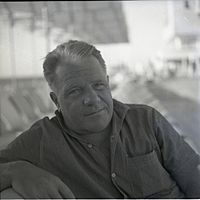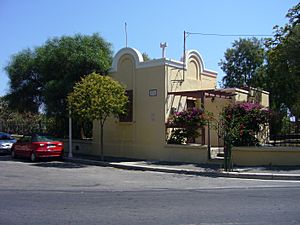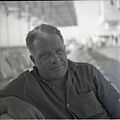Lawrence Durrell facts for kids
Quick facts for kids
Lawrence Durrell
|
|
|---|---|

Lawrence Durrell during his visit to Israel in 1962
|
|
| Born | Lawrence George Durrell 27 February 1912 Jalandhar, Punjab, British India |
| Died | 7 November 1990 (aged 78) Sommières, France |
| Occupation |
|
| Nationality | British |
| Education | St Edmund's School, Canterbury |
| Period | 1931–1990 |
| Notable works | The Alexandria Quartet |
| Spouses |
Nancy Isobel Myers
(m. 1935; div. 1947)Eve "Yvette" Cohen
(m. 1947; div. 1955)Claude-Marie Vincendon
(m. 1961; died 1967)Ghislaine de Boysson
(m. 1973; div. 1979) |
| Parents |
|
| Relatives |
|
Lawrence George Durrell (27 February 1912 – 7 November 1990) was a British writer. He wrote novels, poems, plays, and travel books. He was the older brother of Gerald Durrell, a famous naturalist and writer.
Lawrence was born in British India to British parents. When he was eleven, he was sent to England for school. He didn't enjoy formal education much. However, he started writing poetry at age 15. His first book was published when he was 23.
In 1935, he moved with his mother and younger siblings to the Greek island of Corfu. Durrell lived in many different countries throughout his life. These travels often inspired his writing.
His most famous work is The Alexandria Quartet. This series of four novels was published between 1957 and 1960. The first book, Justine, is especially well-known. Later, he wrote The Avignon Quintet, which also became popular.
Durrell supported himself by working for the British government's Foreign Service. His time in places like Alexandria, Egypt and Rhodes gave him many ideas for his books. He married four times and had a daughter with his first two wives.
Contents
Early Life and Schooling
Lawrence Durrell was born in Jalandhar, British India. His parents, Louisa and Lawrence Samuel Durrell, were British. His father was an engineer. Lawrence was the oldest of four children. His younger siblings included the famous naturalist Gerald Durrell, Leslie Durrell, and author Margaret Durrell.
Like many British children in India, Lawrence was sent to England for school. He was eleven years old at the time. He went to St. Olave's Grammar School and then St. Edmund's School in Canterbury. He didn't like school much and didn't go to university. However, he began writing poetry seriously when he was 15. His first collection of poems, Quaint Fragments, came out in 1931.
In 1928, Lawrence's father passed away. His mother moved the family to England. In 1932, they settled in Bournemouth. There, Lawrence and his brother Gerald became friends with Alan G. Thomas, who owned a bookstore.
Adult Life and Famous Books
Moving to Corfu and First Books
On January 22, 1935, Durrell married Nancy Isobel Myers. This was his first of four marriages. Durrell was not happy living in England. In March 1935, he convinced his new wife, his mother, and his younger siblings to move. They all went to the Greek island of Corfu. They hoped to live more cheaply there. They also wanted to escape what Durrell called "the English death," meaning the dull English culture.
That same year, Durrell's first novel, Pied Piper of Lovers, was published. Around this time, he found a copy of Henry Miller's novel Tropic of Cancer. He loved the book and wrote to Miller. This started a long friendship between the two writers. Durrell's later novels, like Panic Spring and The Black Book, were influenced by Miller's style.
In Corfu, Lawrence and Nancy lived a free-spirited life. They first stayed with the rest of the Durrell family. Later, they moved to a small fisherman's cottage called the White House. It was on the coast of Kalami. Their friend, Theodore Stephanides, a Greek doctor and poet, often visited. Henry Miller also stayed there in 1939.
Durrell wrote about his time in Corfu in his novel Prospero's Cell. His younger brother, Gerald Durrell, also wrote about their time there. Gerald's famous memoir, My Family and Other Animals, describes their family life on the island. While both brothers wrote about Corfu, their stories are different. Gerald focuses on the whole family, while Lawrence mostly writes about his own experiences.
Working for the British Government
When World War Two started in 1939, Durrell's mother and siblings went back to England. Lawrence and Nancy stayed in Corfu. In 1940, they had a daughter named Penelope. After Germany invaded Greece, Lawrence and Nancy escaped to Alexandria, Egypt. Their marriage was difficult, and they separated in 1942. Nancy took Penelope to Jerusalem.
During the war, Durrell worked for the British embassies. He was a press attaché, which means he helped with public information. He worked in Cairo and then Alexandria. In Alexandria, he met Eve (Yvette) Cohen. She was a Jewish woman from Alexandria. She became the inspiration for the character Justine in his famous The Alexandria Quartet. After his divorce from Nancy, Durrell married Eve Cohen in 1947. Their daughter, Sappho Jane, was born in 1951.
In 1945, Durrell moved to Rhodes, a Greek island. He lived there with Eve. This time inspired his book Reflections on a Marine Venus. It's a beautiful description of the island.

Life in Other Countries
In 1947, Durrell became the director of the British Council Institute in Córdoba, Argentina. He gave talks about culture there for 18 months. He returned to London in 1948. Then, he was sent to Belgrade, Yugoslavia. He worked there until 1952. This time gave him ideas for his novel White Eagles over Serbia (1957).
In 1952, Durrell moved to Cyprus with his daughter Sappho Jane. He bought a house and taught English literature at the Pancyprian Gymnasium. He also worked in public relations for the British government. He wrote about his time in Cyprus in Bitter Lemons, which won an award in 1957. He left Cyprus in 1956.
The Alexandria Quartet
In 1957, Durrell published Justine. This was the first book in his most famous work, The Alexandria Quartet. The series includes Justine, Balthazar (1958), Mountolive (1958), and Clea (1960). These books are set in the Egyptian city of Alexandria during and before World War Two.
The first three books tell the same story from different characters' points of view. Durrell called this a "relativistic" technique. Only in the last book, Clea, does the story move forward in time. Critics praised the Quartet for its rich writing style. They also liked its interesting characters and how it mixed personal stories with political events. Durrell described Alexandria as a main character itself.
In 1962, Durrell was considered for the Nobel Prize in Literature. However, he did not win it.
Later Life in France
Durrell married two more times after Eve Cohen. He married Claude-Marie Vincendon in 1961. She was from Alexandria. He was very sad when she passed away from cancer in 1967. In 1973, he married Ghislaine de Boysson, a French woman. They divorced in 1979.
Durrell settled in Sommières, a small village in France. He bought a large house there. In this house, he wrote The Revolt of Aphrodite, which included Tunc (1968) and Nunquam (1970). He also finished The Avignon Quintet, published from 1974 to 1985. This series used similar writing styles to The Alexandria Quartet.
The first novel in The Avignon Quintet, Monsieur, or the Prince of Darkness, won the James Tait Black Memorial Prize in 1974. The middle novel, Constance, or Solitary Practices (1981), was nominated for the Booker Prize in 1982. It describes France during the German occupation in the 1940s.
Other books from this time include Sicilian Carousel, about the island of Sicily, and The Greek Islands.
Final Years and Legacy
Lawrence Durrell had emphysema for many years due to smoking. He passed away from a stroke in his home in Sommières in November 1990. He was buried in the churchyard of Chapelle St-Julien de Montredon. His younger daughter, Sappho Jane, had passed away in 1985.
Durrell's Work for the Government
Durrell worked for the Foreign Office for several years. He was a senior press officer in Athens and Cairo. He was also a press attaché in Alexandria and Belgrade. He directed British Institutes in Greece and Argentina. He also managed public relations in the Dodecanese Islands and Cyprus. He later turned down a special honor, the Order of St Michael and St George, because he felt his political views might cause problems. Durrell wrote funny books, Esprit de Corps and Stiff Upper Lip, about life in the diplomatic service.
Durrell's Poetry
While Durrell is most famous for his novels, he also wrote many poems. Poet Peter Porter called Durrell "One of the best [poets] of the past hundred years." Porter said Durrell's poetry was "Always beautiful as sound and syntax."
British Citizenship Questions
For much of his life, Durrell didn't want to be seen only as British. He preferred to be called a "cosmopolitan," meaning a citizen of the world. After his death, some questions arose about his British citizenship. He was born to British parents in India, so he was considered a British citizen.
However, in 1966, a change in a law meant that Durrell and many others had to register to keep their British citizenship. He wasn't told he needed to do this. So, even though he was a very famous British writer, he had to apply for a visa every time he wanted to enter Britain. This caused embarrassment for many diplomats.
Images for kids
See also
 In Spanish: Lawrence Durrell para niños
In Spanish: Lawrence Durrell para niños
 | Charles R. Drew |
 | Benjamin Banneker |
 | Jane C. Wright |
 | Roger Arliner Young |



